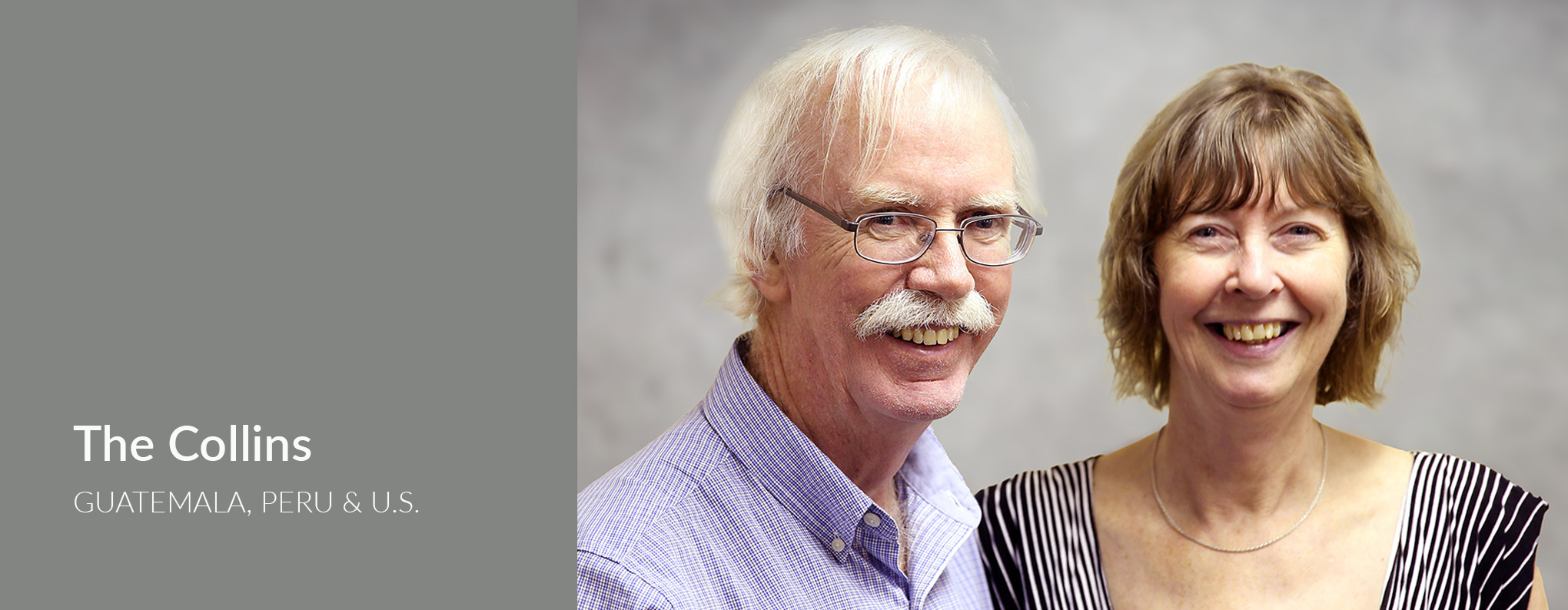
The Collins Family
Collins September 2013 Update
Dear and good friends,
Greetings to you from Comitancillo in the serious part of the rainy season. Even when it’s not raining it is gray and overcast?a lot like Cleveland.
I heard from many of you related to last night’s strong tremor. It was 6.6 on the Richter scale and was felt though Guatemala, Mexico and El Salvador. It rolled down the cobblestone streets of Comitancillo for over a minute around 6:30 PM, local time, and it was followed by a half dozen aftershocks through the night. Feeling the earth move under your feet is very disorienting. Thanks to many for your prayers and concern for people affected. A number of adobe homes tumbled down, but, not here in Comitancillo, as far as I know.
I came down here for a number of reasons. There are two projects going on related to literacy and translation with leaders who were students of mine over the past few years, and I’ve come to encourage them, to speak at meetings and local churches and to otherwise help the brothers and sisters to find strength in God, as Jonathan did for David. This always seems to work in reverse for me.
On Thursday I went with Byron and the LAMP literacy team of four to a small church about a 40-minute drive from Comitancillo. Eighteen adults showed up, mostly women, and a small contingent of children, some who participated, while others watched. These people wanted Byron to teach them to sing hymns in Mam, translated by our friend Misael. Byron was happy to help them but he said that for them to sing hymns on their own, they’d need to learn to read in Mam. So that’s what they’ve been doing for 2-3 hours once a week.
The LAMP group led the folks in some songs, in a short Bible study with a workbook with questions that they had to write out answers to. These former illiterates can now read their own language, not only the hymnbook, but the New Testament, and other books as well. The class was so nicely organized and helpful to the students that I felt like a sideshow. This is as it should be. Perhaps the students and teachers were encouraged. I certainly was.
I also am spending time with Samuel and his team of four working on the translation of the Old Testament. This work is progressing slowly but well. They are looking over a draft of the book of Numbers, not the most interesting of Old Testament books, but they are excited and making good progress. We’ve talked about the content of their translation and also the mechanics of writing Mam. I do better at the latter than the former, but I am very proud of the work of both of these groups.
I am enjoying the hospitality of a third group—Mission House Ministries (MHM)—that offers comfortable housing and logistics (like trips to and from the airport in Guatemala City) in support of projects in the village. MHM is also involved with a number of local churches and in theological training of local pastors and leaders (this picture is of the theology students and profs).
Nan and I are also in the midst of a move from our beloved Ohio to Raleigh, North Carolina. Elisa and Yury live there, along with three of our four grandchildren. Nan’s mother is moving there as well and we hope to turn the pressure up on some of our friends and family as well. It’s got mountains, beaches and the Research Triangle. We are helping to move Nan’s Mom while we are in the same boat—or, more accurately, the same rental truck.
Moving is a hassle, if you haven’t tried it lately. We’re glad that we’ve had a lighter teaching load this year to help us in the aftermath of Nan’s father’s home-going in March. Nan and her sisters have helped their mom get packed and moved, while helping all of us to “release” the farm that the family called home for over 60 years. So two households are being moved, Nan’s mom’s and ours.
I am still churning away on my book on Mam language and cultural values. I didn’t think this would be such a big project, but part of what I’m doing here in Guatemala is affirming the data that I have observed over the last 33 years of contact with the Mam. I’ve had to modify my analysis on a few points and then work the changes through the whole book. I appreciate your patience…and your prayers.
I plan to spend November in southern Mexico with Byron, working on some grammar publications in Mam for Mam readers. As most of you have heard for many years, it’s one thing to promote reading, and quite another to have stuff that people really want to read. This sounds like a no-brainer for English and Spanish speakers, but there are probably less than 100 books published in Mam. Being a good reader expands the value of the Scriptures among indigenous communities, and for people to become good readers, they need to have access to things they want to read. The workshop is set up to help bring some of these ideas to publication. I would like to ask you to pray for Byron who needs a visa to travel to Mexico. It is easy for Mexicans to get visas to come to Guatemala, but very difficult for Guatemalans to get visas to go to Mexico since the Mexican and US governments assume that people headed north will end up illegally in the States. So the default answer to a visa request is “no.”
In December I plan to complete two papers that I hope to present at two different linguistic conferences in January. You might wonder why I spend so much time with linguistics. Perhaps you thought Nan and I were supposed to be missionaries, so what’s all the linguistics about? There are several reasons for the focus on language.
As an academic organization SIL has promised to share data and analysis with interested people., of whom there are many—linguists, anthropologists, government and educational organizations, teachers, Christian ministries, and others. The indigenous people themselves are often told that their languages are simplistic, like animal talk or, at best, they are just diminished languages or dialects. Seeing how their language works is a big encouragement to them. It also helps outsiders who speak the language to do a better job of it, when we have an idea of “how the language works.” Finally, many of these observations make their way into appropriate local publications aimed at helping the Mam better understand the grammar, sounds and meanings of the words and sentences of their language.
Over many years we’ve seen the Mam come to take pride in their language, and we’re grateful to have had a part in that. But there’s still lots to do, which is why I am so encouraged by the three ministries that I mentioned above. These men and women are pushing the same agenda for the honor of God who loves linguistic and cultural diversity.
Come and see us in Raleigh, but let us get settled first.
Thanks and blessings from God to each one.
Wes and Nancy
